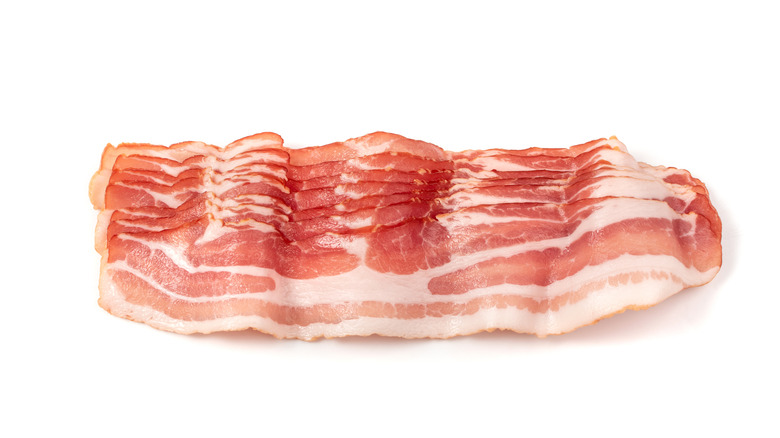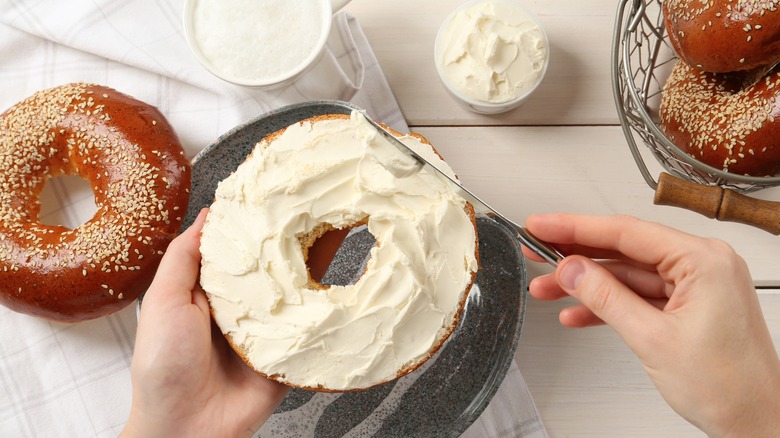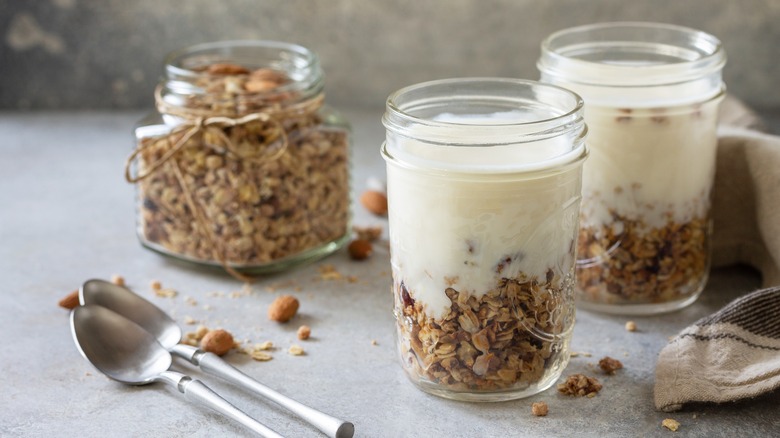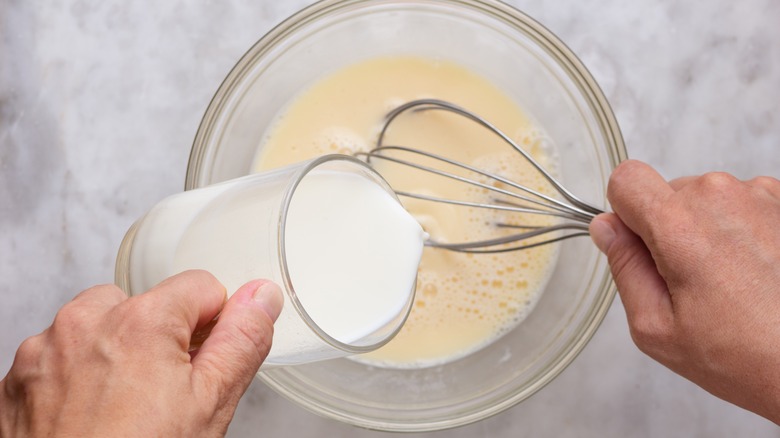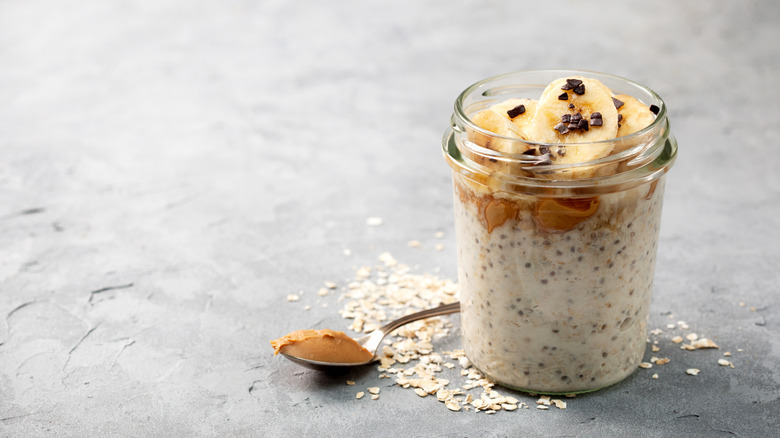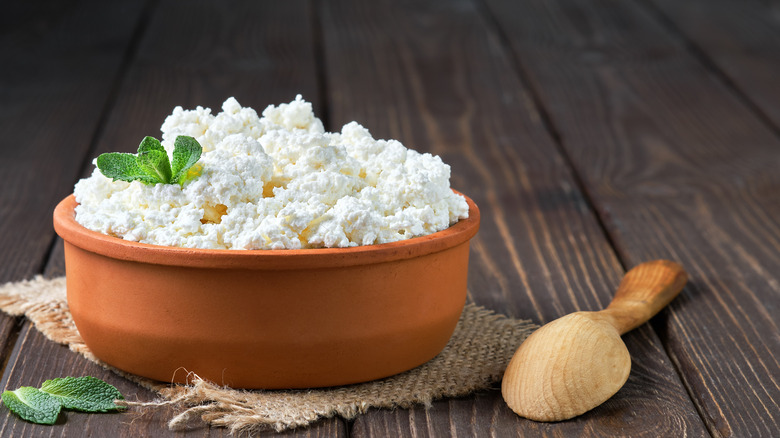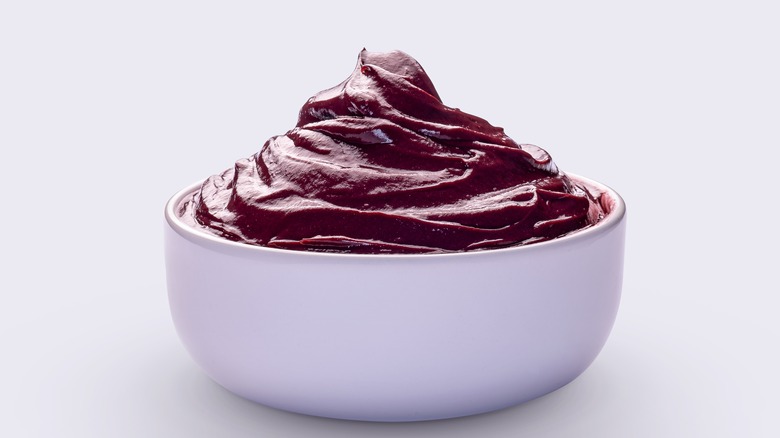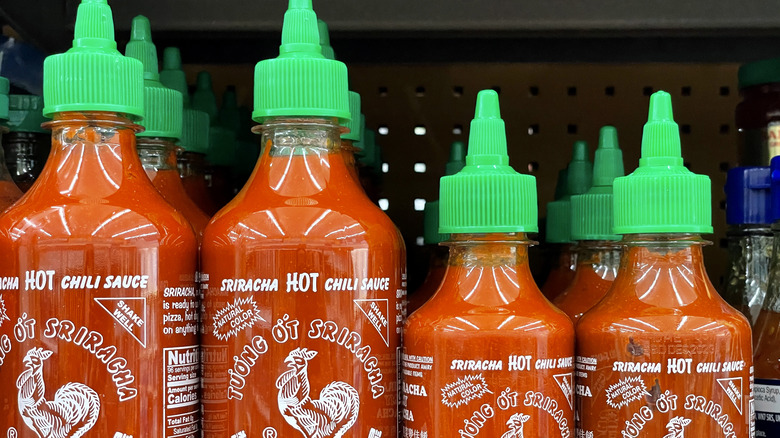How Long Do These Breakfast Foods Really Last In The Fridge?
We all know breakfast is the most important meal of the day. And nothing can ruin the perfect start to the day like finding a moldy English muffin in your fridge or forgetting about the bacon crammed into the crisper drawer.
If you're stocking up for a brunch gathering with friends and family, or merely planning out your breakfasts for the week, you need to consider the viability of the foods purchased on the day you intend to eat them. In reality, not all breakfast foods last as long in the fridge as others, so it is important to plan when you need to make another trip to the grocery store to stock up on the freshest items. Not only will this save you time once you realize your sausage has gone rancid, but it will also help lower your risk of contracting a foodborne illness.
Here are some of the most common breakfast foods and how long each really lasts in the fridge.
Bacon
The most quintessential breakfast food: is bacon! This breakfast meat is one of the most popular choices for American eaters — but it's also equally loved by pathogens like salmonella. Uncooked, opened bacon should last between seven and 10 days in the fridge if it is properly stored in an air-tight container.
If you purchase bulk packs of bacon, you can freeze each in its original packaging and a layer of foil, plastic wrap, or a plastic container. Unopened bacon can last up to two weeks in the fridge, but up to two months in the freezer.
To determine if your bacon has indeed spoiled, check the smell and the color first. Fresh bacon should be a white or pink color, while spoiled bacon will appear a dismal shade of gray or brown. Spoiled bacon will also emit a foul, unmistakable odor.
Bagels, bread, and English muffins
All bread has a similar feeling about the fridge — and a bad one at that. This is because the cool temperature causes the starches in the bread to crystalize and become hard. When you bite into a slice of bread that has been refrigerated, you'll notice the texture is stale. According to MasterClass, the best way to prevent your bread products from staleness and molding is to put the product in a well-ventilated wrapping (like paper or cloth) to discourage mold growth.
If you're making a french toast casserole or bread pudding and stale bread is permissible, you can leave loaves of bread in the fridge for up to two weeks, per the USDA. Bread products left on the countertop typically last at room temperature for up to four days. Freezing bread products is another option as well; slice the bread into individual pieces and store it in small bags in the freezer. This will make the bread easier to cut when you want to eat a slice for breakfast.
Cream cheese
There's no good bagel without a slathering of cream cheese. This soft cheese contains a high-moisture content, so refrigeration is imperative to keeping the cheese safe for consumption. Cream cheese can last a few weeks in the refrigerator past its sell-by date, but it is first important to inspect the cheese before eating it. Spoiled cream cheese will appear yellow in color and may even have tiny mold flecks spread throughout. You should also throw out your cream cheese if you notice pockets of moisture pooling adjacent to dry spots.
Unopened cream cheese typically lasts a month past its purchase date, while opened cream cheese should be consumed within ten days. You can also freeze cream cheese to extend its shelf life; this soft cheese can last up to two months in the freezer.
Jams and jellies
If you're one to top your toast with a layer of jelly, you'll be happy to know that this condiment is fridge-friendly. According to the National Center for Home Food Preservation, full-sugar, cooked jellies made with pectin should last about a month in the fridge after opening. This shelf life may be shortened if the container is left out at room temperature for long periods. To extend the shelf life as long as possible, try to scoop out the jam or jelly you plan to use and return the jar to the fridge immediately.
Low-sugar jams and jellies will have a shorter shelf life. Jams stored in the freezer are only good for three to four weeks in the refrigerator. Be wary of liquids seeping from the jams and jellies as well as yeasty aromas that may signify a spoiled spread.
Home fries
It's easy to make home fries (or breakfast potatoes) for a crowd. This may leave you with tons of leftover potatoes to store in your fridge! Most home fry recipes will last about a week in your fridge in an airtight container.
According to Eating Well, you can freeze seasoned, blanched potatoes in batches in your freezer to pull out for casseroles and breakfasts as needed. After blanching, plunging the hash browns into iced water will stop the cooking process. It is also important to pat the potatoes dry before freezing to prevent moisture from encroaching into the bags and ruining the potatoes. These partially-cooked potatoes will require less oven time when it's time to bake, as well as prevent the watery, iced texture of raw potatoes that have been frozen.
Yogurt
Yogurt is a delicious probiotic treat for breakfast. This fermented milk product is filled with beneficial bacteria, protein, and healthy fats. Plus, you'll be happy to know that yogurt has a relatively long shelf life in your refrigerator. Unopened yogurt can last between two to three weeks after opening in the refrigerator, or up to two months in the freezer. Greek yogurt, which contains a slightly different blend of bacteria than traditional yogurt, lasts up to two weeks in the fridge and less than a month in the freezer.
There are some important signs to note that signify your yogurt has gone bad. Spoiled yogurt emits a pungent, acidic odor and potentially bloats the yogurt container. You may also see a cloudy layer forming on top of the yogurt. A thin, almost translucent layer of liquid is normal; this is just the whey. But, cloudy yogurt can signify bacteria that will make you sick.
Pancake batter
If you're cooking for a crowd, making a ton of pancake batter is just a normal occurrence. But be advised, the batter can indeed spoil before it is transformed into a griddled piece of happiness. Pancake batter can last up to four days in the refrigerator, but may spoil more quickly if it is left out at room temperature for an extended period. Always make sure the ingredients you are using in your pancake batter (especially eggs, cream, and milk) are not spoiled. Since most pancake batter contains dairy or eggs, it can make you sick if it is spoiled. If you are a vegan baker, you are still advised to store your pancake batter in the fridge as many shelf-stable ingredients may still lead to pathogen exposure.
If you are worried about your pancake batter spoiling before you can cook it, you can pour the batter into a freezer-safe container and store it for up to a month.
Sausage
Ground sausage is the perfect addition to a quiche or formed into traditional sausage patties. But can your ground sausage go bad even if it's in the refrigerator? The simple answer is yes. Ground sausage is one of the most perishable ground meats sold in the grocery store.
According to Baking Kneads, ground sausage is typically only good up to three days after purchase. Raw sausage that is still safe to eat is pink in color, firm in texture, and does not emit a particularly strong foul odor. Ground sausage past its expiration will exhibit a dark gray color with a layer of slime on its exterior (yuck). If properly stored in the freezer, ground sausage can last up to four months. Cooked breakfast sausage can last three to four days in the fridge or up to four months in the freezer.
Overnight oats
Overnight oats captured the culinary community's eye for their ease of preparation and nutritional value. Although it might be tempting to meal-prep these simple breakfast on-the-go jars, food scientists advise not. Overnight oats should only be prepped and refrigerated a maximum of four days from intended consumption. The primary reason for this is that overnight oats containing dairy-based ingredients, like Greek yogurt or milk, have the potential to spoil and contaminate the surrounding ingredients.
If you're preparing for the nuclear apocalypse and feel the need to freeze your overnight oats, you can do so for about six months. Add berries and toppings right before eating to preserve the texture. Moreover, you may need to stir the overnight oats heavily to reincorporate all the ingredients after freezing. As the name would suggest, we recommend just making overnight oats the night before you plan to eat a jar.
Coffee
Storing coffee in the fridge can cause moisture to condense and subsequently change the flavor profile of your favorite morning brew. For the best cup of coffee, store your beans in a dark, air-tight location away from temperature changes, such as a pantry. You can also purchase coffee bags that have a one-way valve to emit gas while not allowing air or moisture into the bag. Coffee should be consumed within two weeks of roasting for optimal flavor.
If you make too much drip coffee, storing the leftovers in the fridge for ice coffee is always an option. According to Above Average Coffee, black coffee can last up to two weeks in the refrigerator, but consuming within two to three days is most optimal. Coffee with milk or creamer will not last as long as black coffee; you'll notice separation within a few days.
Lox
Lox is a smoked salmon accompaniment to everything bagels and cream cheese. The exact shelf life of smoked salmon is dependent on its curing and its packaging, but Lacadamie reports that an opened container of lox should last about seven days in the fridge, while an unopened container will last about two or three weeks. Honey-smoked salmon can last slightly longer than other preservation types because of the high-sugar content; the sugar isn't as favorable to pathogens.
Hot-smoked salmon typically lasts longer in a freezer than cold-smoked salmon; up to three months compared to one month, respectively. This is because the hot-smoked salmon is exposed to temperatures above 120 F — which is an environment unfavorable to pathogens. Plus, smoked salmon is typically coated in a layer of pepper, which does not lend well to pathogen growth.
Orange juice
Orange juice is a must-have for breakfasts and brunch alike. Although you might be tempted to leave orange juice out for your guests to enjoy, that might not be the best idea. Leaving perishable foods like orange juice out for more than two hours (or less than an hour at 90 F) can prompt the spread of pathogens like E Coli. Lactic acid bacteria can start fermenting the juice over time as well, thus altering the flavor of the juice.
Pasteurized, store-bought orange juice can withstand more time out of the fridge than fresh-squeezed orange juice. Fresh orange juice lasts two to three days in the fridge, according to Chew the World. In comparison, pasteurized orange juice can last up to seven days in the fridge after it's opened. If the orange juice is unopened, it can last up to five days past the "best by" date on the carton.
Pork roll
Pork roll (also known as Taylor ham) is a novelty outside of New Jersey and New York, but you may see this popular breakfast sandwich ingredient pop up occasionally. According to The Whole Portion, this meat can last between three and five days in an air-tight container in the refrigerator. Pork roll tends to taste like the food it's refrigerated with, so it is important to firmly shut its container. Additionally, storing the pork roll in the center of the refrigerator rather than the doors is important to prevent temperature changes that may spoil the meat.
Pork roll can also be frozen for up to six months. The meat will start to lose some of its flavors over time, so it is important to use it up within the first two months.
Muffins
If you're baking muffins in bulk, it may be more beneficial to pop the muffins in your refrigerator until you're ready to eat one. Savory muffins typically last about six days in the refrigerator; ingredients like cheese and bacon may cause the muffins to spoil if you forgo refrigeration. Sweet muffins, such as blueberry and chocolate chip muffins, should be kept away from the refrigerator to preserve the soft, crumbly texture.
To store your muffins in the fridge, first line the container with a layer of paper towel. This will absorb the moisture from the muffins and keep each one super fresh. After the muffins are in the container, add another layer of paper towel on top to absorb the remainder of the moisture. You can freeze the muffins for up to three months in a resealable bag and reheat individual muffins when you feel the craving hit.
You'll also want to be sure to adequately cool your freshly baked muffins before storing them. This prevents moisture from building up in the container and further damaging the muffin's texture.
Melon
Watermelon only needs to be refrigerated after its cut; not only does a whole watermelon take up a ton of space in the fridge, but the fridge can also alter the taste and texture of the whole melon. Uncut watermelon can last on the counter for a few weeks, while refrigerated, cut watermelon should be eaten within a day of slicing. Neglecting to refrigerate watermelon after it's been cut cuts its safety window down to about two hours.
According to MasterClass, sliced cantaloupe pieces can last up to three days in the fridge. Diced cantaloupe should be consumed within one or two days of slicing. Adding a spritz of lemon juice before packaging the cantaloupe in an air-tight container will slow the oxidative process and result in a fresher-looking melon cube.
Cottage cheese
Information from Healthline suggests that an opened container of cottage cheese can last five to seven days in the fridge. It is important to leave the cottage cheese in its original container or transfer it to a container with an air-tight seal to prevent premature spoilage.
If you leave cottage cheese out at room temperature for more than two hours, it should be discarded. You can also freeze cottage cheese for up to three months by transferring it to a resealable freezer back or air-tight containers. Cottage cheese that has been defrosted in the fridge can last up to four days past the seven-to-10-day window of non-frozen non-opened cottage cheese.
Maple syrup
Maple syrup is a must-have for pancakes and waffles, but the better question is where you should store it. Maple syrup should be stored in the refrigerator to slow the growth of mold and bacteria for up to six months. If you plan to leave your maple syrup in the fridge for more than three months, we recommend transferring the syrup to a glass or tin container. This is because the plastic "breathes" and can make the syrup susceptible to pathogen takeover.
Once transferred to another container, the maple syrup should last about a year. As with all food products, monitor for changes in the taste, texture, and smell of the syrup over time.
Tortillas
Tortillas are a versatile essential for breakfast wraps, so it is important to always have a few fresh ones on hand. Tortillas don't have to go in the fridge. Mass-produced wheat tortillas can last between 16 and 45 days either at room temperature or in the fridge. There are some caveats to this, though; tortillas should be kept in an air-tight bag to maintain maximum freshness. If you don't plan on using tortillas for a while, you can always pop these flatbreads in the freezer and take them out as needed.
Unlike wheat tortillas, corn tortillas do not stay fresh for as long. Corn tortillas last about ten days at room temperature or up to eight weeks in the fridge.
Açaí bowl
Açaí bowls have surged in popularity in recent years. The açaí's bright color and potential for fun toppings make the smoothie bowl a fresh, delicious breakfast treat.
Craving Home Cooked notes that açaí bowls should not be stored with the toppings to prevent unnecessary mushiness. If stored in an air-tight container, the smoothie portion of the bowl can last up to three days in the fridge. If you're meal-prepping for the week (or just don't want to wash the blender over and over again) you can prepare the smoothie, pour it into a freezer bag, and thaw it in the fridge for at least a day before you plan on preparing it.
Hot sauce
No savory breakfast is complete without a bit of heat! Not all hot sauces require refrigeration, because pepper, vinegar, and salt make the contents unfavorable to pathogens. But, homemade hot sauces or those made with a dairy, egg, or mayonnaise base must be refrigerated to prevent foodborne illnesses.
Adding a hot sauce to a refrigerator, even if it's not absolutely necessary, can prolong the shelf life. The average hot sauce lasts anywhere from two to five years. The refrigeration can also maintain the color of the hot sauce and brighten the flavor a little bit. In short, don't kick yourself if you leave the hot sauce out overnight, but try to put it in a cool place in the fridge so you can enjoy some spice for as long as you can.
Shredded cheese
Unlike dry cheese, shredded cheese must be refrigerated because of its high moisture content. The Food Network recommends storing any type of fridge cheese (especially stinky cheese) in the crisper drawer of the fridge. The humidity in this drawer is contained and will keep your cheese tasting fresh for longer. When placing your cheese back in the fridge, always make sure to press the air out of the bag to keep your cheese moist. Healthline suggests eating shredded cheese within five-to-seven days of opening the bag.
While you can freeze cheddar shreds for up to two months, freezing will dramatically change the texture and flavor of the product. Only freeze cheese if you absolutely have to, or if you plan on making a dish where the texture of the cheese isn't too important.
Chocolate milk
Chocolate milk is a childhood favorite. After opening, this beverage will last up to a week after its "sell-by" date printed on the package. Since chocolate milk contains dairy, it should always remain refrigerated, per Still Tasty. Always store chocolate milk in its original package and away from the doors of the fridge to prevent contamination and preserve the integrity of the milk.
Like other dairy products, chocolate milk should only be frozen with caution. Although chocolate milk can last a few months in the freezer, it will have a grainy texture once it is thawed. If you plan on using chocolate milk for baking, freezing the milk may be an acceptable option. Otherwise, we recommend buying a fresh carton when you need it.
Grits
Grits are half of the classic Southern breakfast: shrimp and grits. Per Lucky Belly, grits do not survive well in the fridge. While uncooked grits can last up to five years in a pantry, cooked grits only last about one week in the fridge. Spoiled grits are easily identified by a rancid smell and color change, as well as potential mold spots forming on the surface.
In the pantry, instant grits tend to last longer than stone-ground grits. If you choose to place your containers of grits in the fridge rather than a pantry, you'll find that instant grits last about two years, while stone-ground grits only last about a year after the printed date.
Coffee creamer
Coffee creamer is an ingredient most folks have to have in their house at all times. Boat Basin Cafe notes that unopened dairy creamers last about two weeks past the expiration date in the fridge. If you open the flavorful coffee additive, most companies generally recommend consuming the creamer within a week. Dairy creamers need to be refrigerated because of potential pathogen transmission.
If you're concerned with the shelf-life of your refrigerated creamer, you can try using a powdered creamer made with fat and sugar. These powders do not require refrigeration and can last several months if stored in a dark, dry location.
Eggs
What's breakfast without the classic egg? Whether you like your eggs scrambled, over-easy, or fried, it's important to keep these eggs as fresh as possible. Whole eggs last about four to five weeks in the fridge. For best results, store your eggs in the original compartment and do not leave the carton on your refrigerator door. The constant opening and closing of the fridge can prematurely spoil your eggs. Instead, leave the carton in a consistently cold location in your fridge.
If the eggs are removed from the shell, the shelf-life decreases significantly. Egg yolks or beaten eggs should be consumed within two days, while egg whites are good for up to four days.

